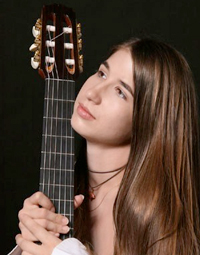by Rory O’Donoghue

Opting to let the music speak for itself, Poláčková played with sensitivity but muted expression, her phrasing a little unimaginative. The performance of Weiss’ Suite XIV in D was beautiful, if understated. She chose to play the pieces through without leaving room for applause, reveling in the austere atmosphere, which was moving.
She closed the first half with Bach’s Chaconne from the Partita in d for solo violin, BWV 1004. The titanic movement always feels a bit odd when taken out of context, without the leadup established by the earlier four movements. Poláčková played well, but the pacing was hurried, leaving no room to enjoy each phrase before barrelling into the next.
Performing on a modern guitar, Poláčková found her stride in the second half of the program, which felt like a different concert entirely. She came alive during Manuel Maria Ponce’s Five Preludes, delighting in the beguiling chord progressions. The music is intricate yet free, and Poláčková was in complete control.
Ponce had a close relationship with Spanish guitar virtuoso Andrés Segovia, who heard Arcangelo Corelli’s La Folia in concert in the mid-1920s and was greatly impressed. He appealed to Ponce with a request: “I want you to write some brilliant variations for me on the theme of the Folias de Espana. I want this work to be the greatest piece of that period, the pendant of those of Corelli for violin on the same theme.” Ponce delivered with the colossal Variations sur “Folia de Espana” et Fugue, which Poláčková chose to end her concert.
This was the most potent part of the performance, a welcome injection of a wide variety of feelings. She played with lovely momentum through the variations, building smartly into the fugue, and the whole thing was deeply emotive. To cap off the stellar second half, she gave the enthusiastic audience an artful encore on her nine-string.
Published on ClevelandClassical.com June 24, 2019.
Click here for a printable copy of this article


